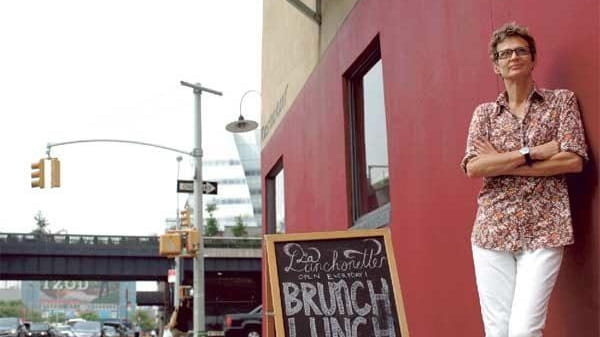Hard times under the High Line for small businesses

Photo by RJ Mickelson, amNY Credit: Photo by RJ Mickelson, amNY
Many of the high hopes that small-business owners had for the High Line have fallen hard.
The lush green artery is killing off a chunk of New York’s entrepreneurial and gritty industrial past as the real estate developers, landlords and other profiteers cash in on the city’s latest chic attraction, some small- business owners said.
The elevated park has been widely praised since its first leg opened in 2009, developing into a major tourist attraction. But few of the 2 million annual visitors likely hold the opinion of the owner D & R Auto Parts.
“The High Line sucks,” he griped to amNewYork. He said he would “rather have my knees cut off” than take a stroll along the sylvan pathway, as his profits have dropped 35% to 40% since it opened. Prior to the 2005 zoning changes that encouraged development to help the High Line, the area was a sparsely populated urban backwater, filled with low-rise buildings, artist lofts, auto shops and small industry. Now it brims with luxury housing, high-end boutiques and tourists from all over the globe.
Local businesses — “the marble countertop guy, the bar, the restaurant” — are vanishing as a result of the “perfect storm” caused by High Line-related gentrification, the increasing cost of operating a small business, the city’s stepped-up enforcement of revenue-generating activities such as ticket writing and inspections, and the recession, the auto-parts vendor lamented. He refused to be quoted by name, saying he feared retribution by Mayor Michael Bloomberg.
Beloved by the city’s arty boulevardiers, the renovated train trestle has not only been a windfall for landlords and real estate developers, but also “owners of residential properties because it preserved their views of the Hudson River,” noted Mitchell Gilbert, a real estate lawyer and partner in Windels, Marx, Lane & Mittendorf.
But a blessing to others has proven to be a bane for some longtime inhabitants facing skyrocketing rents, evictions and a revision of the area’s economic ecosystem.
“The value of all the buildings around the High Line went up based on the increased development,” explained Melva Max, the owner (with her husband, Jean-Francois Fraysse) of La Lunchonette, which has been at 10 Avenue and 18th Street for 23 years. Many of her regular customers have had to move, and La Lunchonette’s future is also in peril, Max acknowledged, since many building owners are looking to sell properties that have soared in value.
Her neighbor, Carolyn Alexander, a partner in the art gallery Alexander and Bonin, is especially chagrined.
“We write a check to Friends of the High Line once a year,” but the people who use it “don’t come down off the High Line to go to art galleries,” she said.
Friends of the High Line, a nonprofit that helps maintain the park, didn’t respond to requests for comment. But Bob Benfatto, the district manager of Community Board 4, said the problems faced by the small businesses in the area are typical of those occurring throughout “the city, and on the West Side in particular.”
The High Line is basically “a good thing for the area,” said Benfatto. New hotels and the jam-packed Chelsea Market (which Alexander said went from being “our neighborhood haven” to “our neighborhood nightmare”) draw in tourists.
Small concessionaires, meanwhile, also are benefiting, said Benfatto.
While there is no official count of the number of small businesses that have had to leave the area, a spokeswoman for NYC’s Small Business Services said it offers help to owners in the form of referrals to pro bono attorneys. Also, she said, the agency will “work with the small businesses to try and access capital.”
Gentrification was indeed already afoot, but it accelerated with the train trestle’s renovation, said John Jobbagy, owner of the eponymous meatpacking firm and leader of the Gansevoort Market co-op.
Most of the eight remaining meat-packers are protected by a long-term lease they have in their NYC-owned building, but “little by little, development is chasing out people like us,” because landlords find retail shops more lucrative than wholesale food and repair businesses, Jobbagy said.
The meat-packer felt the squeeze when the gas station at Horatio and Eighth Avenue closed, and his trucks now must drive farther for diesel fuel. And the 90-year-old shop where he has his trucks repaired — Brownfeld Auto Service on West 29th Street — is in an epic fight to remain after the landlord declined to renew its lease.
“Alan is very important to us,” said Jobbagy, referring to Alan Brownfeld, the shop’s owner. “If he leaves the neighborhood, it will definitely have an effect.”
What has happened to the neighborhood’s longtime denizens “is not fair and it’s not right,” said Brownfeld. “There used to be hookers all over the block,” he added wryly. Because of the High Line, he observed, “now you can’t even find one.”
